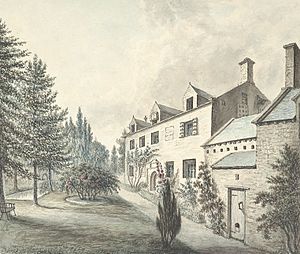Ystumllyn
| Ystumllyn | |
|---|---|
 Ystumllyn in 1794 by John Ingleby | |
| Location | Criccieth, Gwynedd, Wales |
| Coordinates | 52°55′33.53″N 4°12′18.53″W / 52.9259806°N 4.2051472°W |
| Built | late-16th-century |
| Architectural style(s) | Vernacular |
Listed Building – Grade II* | |
| Designated | 12 December 1994 |
| Reference no. | 4291 |
Ystumllyn is a Grade II* listed house in Criccieth, Wales. Founded in the late-16th-century, and significantly expanded in the early-18th-century, it is remarkable as an "important example" of the vernacular architecture of both periods.
History
[edit]The house was apparently built at the end of the 16th century by Ellis ap Cadwaladr (d. 1597),[1] a member of the Welsh Ellis family, which claimed to trace its lineage back to Gollwyn ap Tangno, founder of one of the Fifteen Tribes of Wales.[2] Ellis obtained the property from the Crown,[1] and is the first member of the family to be described as "of Ystumllyn".[3] When it was first built, the house was likely one of the earliest storied buildings in the region.[1] Before 20th-century renovations, the house bore two dated inscriptions of 1720 and 1729 giving a likely date for the extensive 18th-century remodeling and extensions.[1] The owner in this period was Rev. Humphrey Wynn (d. 1724),[2] whose initials are featured on the earlier of these inscriptions.[4] By 1725, it was in possession of Ellis Wynn (d. 1759) who held in until his death.[5] In 1824, the estate passed to philologist Rowland Jones.[2] The roof was raised and the fenestration was remodeled in the 19th century.[4] In c. 1946, J. Egbert Griffiths of Porthmadog carried out several minor alterations, adding some extra windows and rearranging the internal room structure.[1] On 12 December 1994, the building was designated a Grade II* listed building,[1] a listing reserved for "particularly important buildings of more surthan special interest".[6]
The house was home to several local notables throughout its history. The Welsh poet Gruffydd Phylip (d. 1666) composed several poems addressed to the Ellis family, including a poem directly referencing the house, "Hiraeth y bardd am Ystumllyn" ("The Bard's Longing for Ystumllyn").[2] John Ystumllyn (d. 1786), who took his name from the household, was employed by the Wynn family at this estate as a gardener and survived as the first well-recorded black person of North Wales. He was of uncertain origins, and was possibly kidnapped from Africa by the Wynn family, but lived out a happy life in Ystumllyn, eventually running away with and marrying a local woman.[5]
Architecture
[edit]
Ystumllyn is a rubble-built house of two stories, composed of two blocks arranged into a T-shaped plan. The east-facing block is the earliest part of the building, dating to the late 16th century, while the north-facing block (which bisects the east block) was constructed in the early 18th century.[4] The building has been described as historically remarkable in the British Listed Buildings' rationale for registering it as a Grade II* listed building; its original component "incorporates an important example" of 16th-century architecture, while its 18th-century additions "represent high quality vernacular work of the period".[1]
Gallery
[edit]-
Large hall in the south of the original block, 16th-century.[4]
-
Original doorway in the east side of the original block, 16th-century.[4]
-
Panel in hall, left of fireplace, depicts the arms of Owain Gwynedd (1100–1170), king of Gwynedd.[4]
-
North bedroom door, 18th-century. One of the few remaining unmodernised parts of the north wing.[3]
-
Fireplace in south bedroom, 18th-century.[3]
-
Staircase, reassembled during 18th-century renovations.[3]
References
[edit]- ^ a b c d e f g British Listed Buildings.
- ^ a b c d Davies 1959.
- ^ a b c d RCAHMW 1964a, p. 240.
- ^ a b c d e f RCAHMW 1964a, p. 239.
- ^ a b Green 2019.
- ^ "Listed Buildings". Historic England. Retrieved 28 October 2019.
Sources
[edit]- "Ystumllyn: A Grade II* Listed Building in Criccieth (Cricieth), Gwynedd". British Listed Buildings. Retrieved 28 October 2019.
- Davies, William Llewelyn (1959). "ELLIS family, of Bron y Foel and Ystumllyn, Ynyscynhaearn, Caernarfonshire". Dictionary of Welsh Biography.
- Green, Andrew (10 October 2019). "Ystumllyn, John (d. 1786)". Oxford Dictionary of National Biography (online ed.). Oxford University Press. (Subscription or UK public library membership required.)
- Royal Commission on the Ancient and Historical Monuments of Wales (1964a). An Inventory of the Ancient Monuments in Caernarvonshire: II Central: the Cantref of Arfon and the Commote of Eifionydd. London: Her Majesty's Stationery Office.
- Royal Commission on the Ancient and Historical Monuments of Wales (1964b). An Inventory of the Ancient Monuments in Caernarvonshire: III West: the Cantref of Lleyn together with the General Survey. London: Her Majesty's Stationery Office.



![Large hall in the south of the original block, 16th-century.[4]](http://upload.wikimedia.org/wikipedia/commons/thumb/4/48/Ystumllyn%2C_hall%2C_late_16th-century%2C_Inventory_of_the_Ancient_Monuments_in_Caernarvonshire.png/401px-Ystumllyn%2C_hall%2C_late_16th-century%2C_Inventory_of_the_Ancient_Monuments_in_Caernarvonshire.png)
![Original doorway in the east side of the original block, 16th-century.[4]](http://upload.wikimedia.org/wikipedia/commons/thumb/1/18/Ystumllyn%2C_door%2C_late_16th-century%2C_Inventory_of_the_Ancient_Monuments_in_Caernarvonshire.png/197px-Ystumllyn%2C_door%2C_late_16th-century%2C_Inventory_of_the_Ancient_Monuments_in_Caernarvonshire.png)
![Panel in hall, left of fireplace, depicts the arms of Owain Gwynedd (1100–1170), king of Gwynedd.[4]](http://upload.wikimedia.org/wikipedia/commons/thumb/5/56/Ystumllyn%2C_panel_in_hall%2C_late_16th-century%2C_Inventory_of_the_Ancient_Monuments_in_Caernarvonshire.png/236px-Ystumllyn%2C_panel_in_hall%2C_late_16th-century%2C_Inventory_of_the_Ancient_Monuments_in_Caernarvonshire.png)
![North bedroom door, 18th-century. One of the few remaining unmodernised parts of the north wing.[3]](http://upload.wikimedia.org/wikipedia/commons/thumb/0/05/Ystumllyn%2C_bedroom_door%2C_18th-century%2C_Inventory_of_the_Ancient_Monuments_in_Caernarvonshire.png/221px-Ystumllyn%2C_bedroom_door%2C_18th-century%2C_Inventory_of_the_Ancient_Monuments_in_Caernarvonshire.png)
![Fireplace in south bedroom, 18th-century.[3]](http://upload.wikimedia.org/wikipedia/commons/thumb/7/79/Ystumllyn%2C_S._bedroom%2C_18th-century%2C_Inventory_of_the_Ancient_Monuments_in_Caernarvonshire.png/218px-Ystumllyn%2C_S._bedroom%2C_18th-century%2C_Inventory_of_the_Ancient_Monuments_in_Caernarvonshire.png)
![Staircase, reassembled during 18th-century renovations.[3]](http://upload.wikimedia.org/wikipedia/commons/thumb/0/0c/Ystumllyn%2C_staircase%2C_early_18th-century%2C_Inventory_of_the_Ancient_Monuments_in_Caernarvonshire.png/218px-Ystumllyn%2C_staircase%2C_early_18th-century%2C_Inventory_of_the_Ancient_Monuments_in_Caernarvonshire.png)